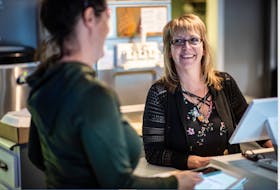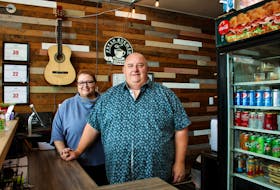People in Newfoundland and Labrador take more potentially harmful medications than anywhere else in Canada, and sometimes those medications aren’t even needed.
Through a partnership with Memorial University of Newfoundland, the Canadian Deprescribing Network (CaDeN) and the provincial government, SaferMedsNL is working to raise awareness around safe and effective medication use. They want healthcare professionals and patients to have meaningful conversations about medications to ensure they are continued when necessary and safely stopped when they are no longer needed.

“Over time, things change,” says Kelda Newport, SaferMedsNL project coordinator. “A medication that was once needed may no longer be needed, and what helped improve health at one point in time may not be beneficial now — and may even cause harm because of side effects and drug interactions.”
The use of potentially harmful medications can lead to extensive health risks, including falls, fractures, hospitalizations and even death, according to the Canadian Deprescribing Network. The rising use of potentially harmful medications in Newfoundland and Labrador is creating an urgency for change.
Dr. Justin Turner, Scientific Director for SaferMedsNL and a research expert in the deprescribing movement, says Newfoundland and Labrador has some of the highest use in the country of three potentially harmful medications: proton pump inhibitors (PPIs) for heartburn and reflux, sleeping pills and painkillers like opioids.
“There is an entire movement that is focused on deprescribing, and Newfoundland and Labrador is not seeing the same improvements as the rest of Canada,” Turner says, “We know some people will benefit from taking these medications every day, however, we also know that many people take them for longer than is needed. That’s why we’re trying to raise awareness at a public level, encouraging people to ask, ‘Do I still need to be taking this medication?’ We’re urging people to talk to their pharmacist, physician, or nurse practitioner to re-evaluate if it’s still providing benefit.”

SaferMedsNL is working to promote safe and effective medication use by encouraging patients to talk to their healthcare professionals about what they’re taking and ask if they still need to be taking it.
Once a healthcare professional has prescribed a medication, Newport says patients may continue to take it for months or even years without questioning if they still need it.
“Medications are often started without a plan for follow-up, but an exit plan or strategy should be a routine part of the initial conversation when any medication is started,” Newport explains. “There are risks associated with taking medications you don’t need and of course, there are many instances where continued medication use is required because the medications are still working and there is an ongoing need for treatment.”
Dr. Debbie Kelly, an associate professor in the School of Pharmacy and director of the Medication Therapy Services (MTS) Clinic, is the project co-lead alongside Dr. Turner. Dr. Kelly says that when the risks of any medication outweigh the benefits, they become potentially harmful or inappropriate for that person.
“The question then becomes ‘Why would we continue to take a medication that we no longer need or may be causing harm?’” says Dr. Kelly. “It’s about ensuring people are taking the right medicines for them at the time they need them, and stopping them when they are no longer required, ideally before problems begin.”
The public awareness campaign is working with patient groups, healthcare professionals and the provincial government to make positive changes to the way patients use medications — and has a goal of reducing the use of potentially harmful medications by 20 per cent by 2021.
“We were excited by the reception we received from the Newfoundland and Labrador 50+ Federation,” says Turner. “Many of their members are taking a handful of medications each day, and they were encouraged to know prescribers and pharmacists are willing to discuss which ones could be stopped.”
Dr. Turner says the NL50+ Federation, the Provincial Advisory Council on Aging and Seniors, the Canadian Association for Retired Persons and other seniors’ groups have been “great advocates” in helping them spread the message to older adults in all corners of the province.
Of course, Dr. Turner emphasizes that before stopping any medications, patients should consult their physician, pharmacist, or nurse practitioner.

SaferMedsNL is also fostering communication between doctors, pharmacists, nurses and their patients by providing free resources like patient education brochures, posters and videos that can be used to start the conversation.
There’s an emphasis on “deprescribing” or stopping medications that might be unnecessary or causing harm in order to maintain or improve a person’s quality of life.
How do you know if you’re taking medications you don’t need to be taking? Newport suggests scheduling a dedicated appointment with your healthcare professional to review your medications. Make sure you bring a complete list of any prescription and non-prescription medications you’re taking, or just bring the medications themselves. Many people don’t realize this is a service offered by community pharmacists and family doctors — and for some people, it’s a free service.
“You want to be able to provide a complete picture of what you’re taking, how much and when,” says Newport. “If you aren’t sure, then bring a family member, caregiver, or friend with you.”
She says it’s especially important to encourage elderly family members to have regular medication reviews with their healthcare professionals.
“Older adults by nature tend to be on more medications, and they’re also more susceptible to side effects because their bodies are unable to metabolize things as effectively as they once could,” says Newport. “Our medications should reflect these life changes. That’s why it’s important to make appointments at regular intervals with your healthcare provider specifically to review your medications.”
When patients and their healthcare professionals talk openly about medication requirements and update their medication plans on a regular basis, Newport says it significantly reduces the risk of someone taking medication that may be causing them more harm than good.
“No one should stop taking their prescription medications without first discussing with their pharmacist, physician or nurse practitioner, but we do want to see patients become more empowered to ask questions about their medications,” says Newport. “Patients are ready to know more about the medications they’re taking. They want to be informed.”
More information is available on SaferMedsNL.ca. Follow them on Twitter (@SaferMedsNL) or Facebook (@SaferMedsNL) to continue the conversation.










